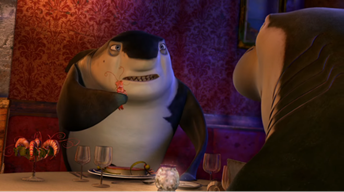
Anybody that grew up within the early 2000s has probably heard about Shark Tale (Rob Letterman, Vicky Jenson, and Bibo Bergeron, 2004). Even if you have not watched the movie, you most likely still know about Lola — the confident, glittering red lionfish who gets introduced with her own intro song, “Gold Digger” by Ludacris. Thanks to the countless memes throughout social media, Shark Tale has been immortalized as a film rooted within Y2K pop culture. However, with it earning a measly 35% on Rotten Tomatoes, and with critics like Bob Longino deeming it a “…loud, visually busy, offensive in its obviousness and virtually empty computer-animated film… ,” it has largely been reduced to a “simple” movie hoarded with silly nonsense and references. While critics focused on unfavorable comparisons to other animation works, many of them missed Shark Tale’s use of queer coding and how it successfully critiques the pressure to conform within a corporate/capitalist society.
The film takes place in Southside Reef, a vertical metropolis where success means reaching the top of the reef and failure means being stuck in the lower end. Main protagonist, Oscar (Will Smith) deals with the latter. He is considered a “nobody” by virtually everyone in the reef. As a child, he thought his father’s job as a whale wash tongue-scrubber, was the “coolest job in the ocean” (Shark Tale 00:16:34-00:16:37). Unfortunately, he quickly learned that that position was seen as the lowest one a fish could have. Instead of receiving applause after a show-and-tell about his dad, Oscar was met with laugher from his classmates and the cruel chant of “Tongue-scrubber! Tongue-scrubber!” (Shark Tale 00:16:41-00:16:52). The incident taught Oscar early on that tongue-scrubbers would always be seen as “less than” and subjected to mockery. It also solidified his belief that “nobody loves a nobody” (Shark Tale 00:16:54-00:16:57). This is why he tries hard to break free from his father’s legacy as he grows older. Now as a tongue-scrubber himself, Oscar not only perpetuates the cycle of working-class struggle, but exemplifies the limited social mobility within the reef.
Oscar dreams of making it to the height of luxury one day. He constantly looks up at the lavish, high-rise apartments at the top of the reef and hopes that one day, he too can live up there as a “somebody.” Those around him though, are always there to squash those aspirations. His own boss, Mr. Sykes (Martin Scorsese), even does so, early in the movie, when he calls Oscar into his office to show him a food chain diagram with Oscar at the very bottom, below whale waste. While otherwise seen as a funny ridicule of the dorky main character, this scene puts into perspective the literal “fish-eat-fish” capitalism within the real world. It closely mirrors the socioeconomic stratification of our own modern society. Working-class individuals are often seen as “inferior” and typically have insurmountable barriers preventing them from moving up in class. It is almost impossible for Oscar to climb the food chain and nobody expects him to, once again dismissing him as a “nobody.” Alongside that, the setting serves as a visual stand-in for New York City through its illuminated billboards of fish celebrities, bustling commercial centers, and tiny stacked apartments of the lower class. Beyond just being fun little references to our world, these elements paint a picture of a place that values image and status over merit and authenticity. As the film progresses, we get to see characters navigate through this facade of a world by maintaining appearances and trying to conform to a heteronormative capitalist society.
Oscar and Lenny (Jack Black) both take on new personas, with Oscar as a fake “shark slayer” and Lenny as a disguised “dolphin” to establish a place for themselves within society. Oscar falsely claims that he can kill sharks, using it as a method to gain respect, fame, and power. After news of Oscar defeating a shark breaks out, Oscar rapidly gains celebrity status; he gets painted across billboards, magazines, and finally acquires that fancy penthouse at the top of the reef he has always dreamed about (Figure 1). Deception is the only way Oscar can achieve social mobility, implying that the social system within the reef is so unfair that real work and honesty are not enough to escape one’s predetermined social standing. Oscar’s desperation for success and validation is his prime motivator in crafting a whole act that will allow him to fit in and succeed in a world of appearances. Lenny, who is a great white shark, similarly conceals his true self. He runs away from his shark family and pretends to be a dolphin to hide from his father who sees him as a faulty shark. Faulty because he does not fit within the norms of shark culture. Traditionally, sharks are seen as “aggressive” and “masculine” predators; Lenny is not that at all. In fact, Lenny is characterized as a vegetarian in the film. There are heavy implications that this is an allegory for queerness.
In one scene, Don Lino (Robert De Niro) is at a fine-dining restaurant with both his sons, Lenny and Frankie (Michael Imperioli). The environment immediately establishes the high-class, apex predator status of sharks. As they eat, Don Lino scolds Lenny about his unusual vegetarian behavior and tells Lenny that he should be more like his brother – a carnivore. Don Lino then plucks a live shrimp from his shrimp cocktail and tries to force Lenny to eat it then and there (Figure 2). Lenny visibly becomes uncomfortable and tries turning down the action, claiming the shrimp contains too many calories. Don Lino quickly gets angered by Lenny’s refusal, continuously pushing the shrimp into Lenny’s face until Lenny finally snaps and yanks all the shrimp away from his father to let them free instead. This is a great disappointment to Don Lino, as the whole act of eating a shrimp was his way of testing Lenny’s masculinity and worthiness of inheriting the family business. Lenny’s inability to complete the task shows Lenny’s deviation from traditional shark expectations. The predator/prey dynamic is used as a metaphor for heteronormative behavior; Lenny’s refusal to conform to it, marks him as an “Other” in shark society, much like how queer individuals are when they are not accepted.

Lenny’s vegetarianism conflicts with his father’s traditional values of predation, and Lenny’s shame and secrecy surrounding his preference mirrors common LGBTQ+ experiences of closeting and code-switching. Lenny is gentle and sensitive away from his family, but when confronting them at a dinner near the end of the film, he is visibly nervous as he attempts to hide his usual flamboyant, upbeat personality. During this scene, he tries to appear a “dominant” and “tough” dolphin. He adjusts his scarf, looks away when his father enters the room, and crosses his arms defensively. To Lenny, this performance is a way of protecting himself from judgement. Yet, both Oscar and Lenny are only able to find happiness when breaking out of these conditioned roles and accepting their authentic identity. Oscar returns to Whale Wash after revealing that he was never was a shark-slayer; finding real fulfillment not through a lie, but with his loved ones and community who he has learned to appreciate. Lenny accepts his identity after getting stuck in the whale wash with his father and essentially “coming out”; which ultimately ends with him and his father hugging and reconciling.
While oftentimes brushed off as a slapstick children’s movie, Shark Tale cleverly makes a bold statement on the importance of rejecting predefined norms within society. It emphasizes that liberation comes from self-expression, not performative conformity. In a world that remains heavily divided today, this film holds a powerful message that reminds us that sometimes the bravest act is living truthfully.
Author Biography
Katie Arce is currently completing her senior year at the University of North Carolina Wilmington, in pursuit of a bachelor’s degree in film studies with a minor in business. After graduating, she plans to use her video production skills to get into the field of global marketing.







































